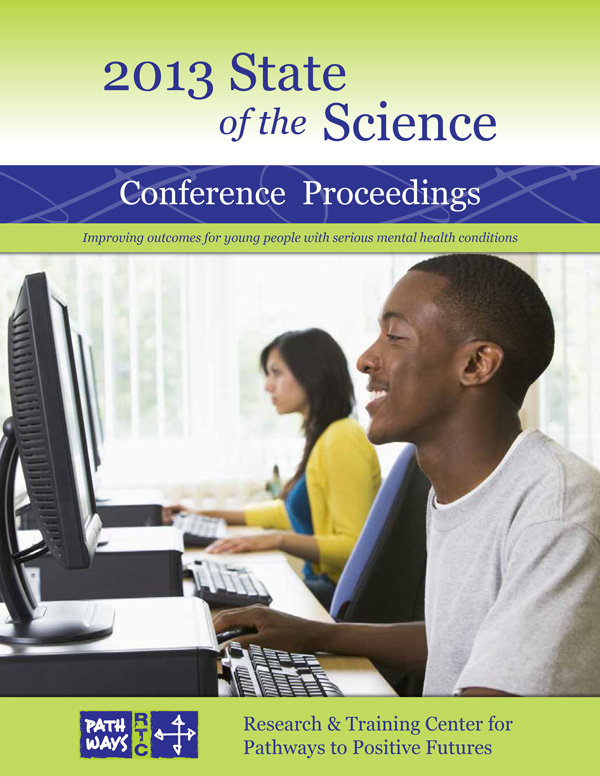State of the Science Conference Proceedings 2013

"State-of-the-Science Conference Proceedings: Improving Outcomes for Young People with Serious Mental Health Conditions" (2013)
This proceedings monograph summarizes the events of the 2013 State-of-the-Science conference, which began with a review of the Pathways to Positive Futures model. The Pathways model is a positive development (PD) approach for working with "emerging adults" who have serious mental health conditions and related needs.
Individual Sections
-
Abstract
The Proceedings describes the results of discussions among young people, family members, researchers and service providers at the 2013 State-of-the-Science Conference regarding how providers can work productively and effectively with young people who experience SMHCs.
-
Pathways to Positive Futures
Background on the Research and Training Center for Pathways to Positive Futures is provided in this introduction.
-
The Pathways to Positive Futures Model: Overview
The Pathways to Positive Futures Model defines a positive development (PD) approach for working with "emerging adults" who have serious mental health conditions and related needs.
-
Agenda and Opening Plenary
The conference began with a plenary session that focused on providers' role in helping young people activate change in their lives.
-
Session 1: Activating Change
This session focused on identifying specific practice elements that providers use to help young people to activate changes they desire in their lives.
-
Session 2: Working with Young People with Diverse Social Identities
Session 2 involved an examination of the ways in which the Pathways model might—or might not—work for young people belonging to diverse social identity groups.
-
Session 3: Instrumental Social Support
During this session, conference participants discussed sources of social support for young people and the needs addressed by social support.
-
Session 4: Supporting the Approach
Session 4 focused on the agency supports, barriers, and needed changes that either promote or inhibit the implementation of a Pathways-like approach and the ability to effectively work with young adults.
-
Session 5: Tackling the Hard Questions
This session focused on: challenges can arise when young people and their families have different perspectives; the future of peer support; youth-provider relationships; and issues with systems that are oriented toward compliance.
-
Final Comments
This section of the Proceedings reflects on conference participants' feedback and reception to the Pathways Model and other themes from the discussions.
-
References
-
Acknowledgments
-
Appendix A: Attendees and Reviewers
-
Appendix B: Agenda
-
Appendix C: Session Worksheets
-
Appendix D: Scientific Addendum: Theoretical, Empirical and Methodological Background for the Pathways Model